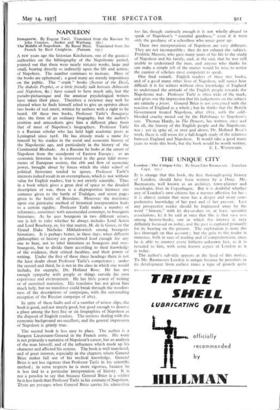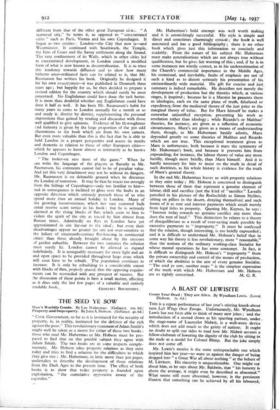THE UNIQUE CITY
Jr is strange that this book, the first thorough-going history of London, should have been written by a Dane. Mr. Rasmussen, well known as an architect, town-planner and sociologist, lives in Copenhagen. But it is doubtful whether any of London's own citizens has a warmer affection for her : it is almost certain that none has a deeper and more com- prehensive knowledge of her past and of her present. Lest any prospective reader should be frightened away by the word " history," with its dry-as-dust or, at least, specialist associations, let it be said at once that this is that rara avis among history-books, one in which the interest is very definitely focussed on today, and the past is explored primarily for its bearing on the present. The exploration is none the less thorough on that account ; but the gain to the reader is immense, both in ease of reading and of comprehension, since he is able to connect every hitherto unknown fact, as it is revealed to him, with some known aspect of London as it is today.
The author's sub-title appears at the head of this notice. To Mr. Rasmussen London is unique because he perceives in its development from earliest times a type of growth quite different from that of the other great European cities. - " A scattered city," he terms it, as opposed to -" corcentrated cities " such as Paris, Vienna and his own Copenhagen. It began as -two entities : London—the City that now is—and Westminster. It continued with Southwark, the Temple,- the Inns of Court and the Savoy settlement along the Strand. The very confinement of its Walls, which in other cities led to concentrated development, in London caused a modified form of what is now known as decentralisation. It is to trace this tendency towards diffusion and to show how many hitherto unco-ordinated facts can be related to it, that Mr. Rasmussen has written his book. Originally he designed it for his own countrymen—it was published in Denmark three years ago ; but happily for us, he then decided to prepare a revised edition for the country which should surely be most concerned. No Englishman could have done the task better. It is more than doubtful whether any F.nglishman could have done it half as well. It has been Mr. Rasmussen's habit for many years to come to London annually for a month or so and study it, district by district, supplementing the personal impressions thus gained by reading and discussion with those well qualified to give opinions. Evidence of his thoroughness rnd industry is given by the large proportion of the 300 odd illustrations to the book which are from his own camera. But even more valuable than this is the fact that he is able to hold London in a proper perspective and assess its merits and demerits in relation to those of other European cities-- which he appears to know almost as intimately as he knows London and Copenhagen.
" The looker-on sees most of the game." When he can write the language of the players as fluently as Mr. Rasmussen, his comments cannot fail to be of peculiar value. And yet this very detachment may not be without its dangers. Mr. Rasmussen is on debatable ground when he discusses the London of tomorrow. It may be that he reacts too strongly from the failings of Copenhagen—only too familiar to him— and in consequence is inclined to gloss over the faults in an opposite direction which seriously perturb those of us who spend more than an annual holiday in London. Many of the growing inconveniences which her vast scattered bulk entail receive scant notice in his book ; but he is seriously alarmed at the rising blocks of fiats which seem to him to violate the spirit of the city as traced by him almost from Roman times. Admittedly no flats in London have yet approximated in site lay-out to the ideal ; but even their disadvantages appear no greater (to one not over-sensitive to the failure of nineteenth-century flat-housing in continental cities) than those already brought about by the excesses of garden suburbia. Between the two extremes the solution must surely lie. London cannot be allowed to expand indefinitely. It is unarguably necessary for more light and air and open space to be provided throughout large areas which will soon have to be rebuilt. The population continues to increase. It is only by rebuilding to a considerable extent with blocks of flats, properly spaced, that the opposing require- ments can be reconciled with any prospect of success. But :he discussion of these points is here a small matter, affecting as it does only the last few pages of a valuable and entirely















































 Previous page
Previous page